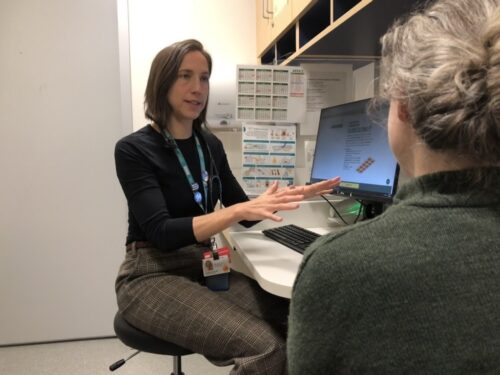Implementing Eat, Sleep, Console Model Improves Neonatal Opioid Withdrawal Syndrome Outcomes
September 2, 2020

Getty Images
The first multi-site study of the ESC model suggests a nonpharmacologic care model focused on maternal engagement is a safe option for widespread use.
THE BOTTOM LINE | Implementation of Eat, Sleep, Console, a new family-centered care model, improved outcomes for both infants with neonatal opioid withdrawal syndrome (NOWS) and moms with opioid use disorder — all without any adverse effects reported, and with less medication for infants, shortening hospitalizations and cost of care. Because these changes were made in academic medical centers and community hospitals alike, the study demonstrates the potential for successful, broad-based implementation of the model, which could impact costs and outcomes.
CONTEXT | A 2018 study published in the Journal of Perinatology showed that using nonpharmacologic approaches to treat neonatal opioid withdrawal syndrome (NOWS) resulted in reduced use of medications, length of stays, and health care costs. NOWS, also known as neonatal abstinence syndrome or NAS, is a condition that impacts newborns exposed to opioids in utero. Often treated in intensive care units, infants with NOWS may experience symptoms including irritability, trouble eating and sleeping, diarrhea, muscle rigidity, and difficulty soothing two to three days after birth.
The Eat, Sleep, Console (ESC) model, developed in 2014, is a family-centered, nonpharmacologic approach to treat NOWS by promoting maternal engagement, breastfeeding, and mother and baby rooming-in and by conducting function-based assessments of infants with NOWS. The approach is a significant change from the widely-used Finnegan Neonatal Abstinence Scoring Tool, a 31-point scoring tool that assesses the severity of withdrawal symptoms to determine the need for medication. The Finnegan tool has been the standard of care since it was established in the 1970s.
STUDY OBJECTIVE | To support a statewide, multi-site quality improvement (QI) initiative focused on hospitals adopting the Eat Sleep Console NOWS Care Tool and assess the NOWS-related hospitalization outcomes.
THE DETAILS | 29 member hospitals from the Massachusetts Perinatal Neonatal Quality Improvement Network collaborative voluntarily participated in this QI initiative between 2017 and 2019; 11 hospitals had fully implemented the ESC NOWS Care Tool by the end of the study. Data was analyzed from the 11 hospitals who implemented ESC, comparing infants pre- (753 infants) and post- (475 infants) implementation.
FINDINGS | Overall, rates of medication treatment for NOWS decreased from 55% to 35%, and length of stay decreased from 14 to 11 days without any increase in hospital re-admissions or emergency room visits. This data demonstrates that infants in a variety of hospital care settings can safely be cared for with the ESC model, promoting a less intensive care setting with maternal engagement and less use of medication for NOWS. The authors note that it is not just the NOWS assessment method used (ESC), but the entire nonpharmacologic care bundle (rooming-in, breastfeeding, maternal presence) that improves outcomes for infants with NOWS.
PULL QUOTE | “Hospitals considering a switch in their NOWS care model may take the results from our study as evidence to support moving infants out of intensive care nurseries and changing their care practice to a more family-centered approach, associated with shorter hospitalizations and less medication exposure for infants with NOWS,” Wachman commented.
Source: Wachman EM et al. (2020). A Quality Improvement Initiative to Implement the Eat, Sleep, Console Neonatal Opioid Withdrawal Tool in Massachusetts — PNQIN Collaborative. Journal of Perinatology.



